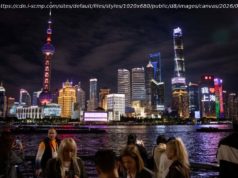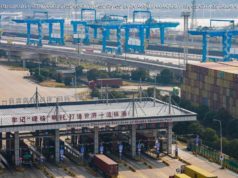President Trump had warm words for Nguyen Xuan Phuc, the leader of a nation the United States views as a defender against an expansionist China.
WASHINGTON — President Trump welcomed the prime minister of Vietnam to the Oval Office on Wednesday, cutting business deals not long after transferring a Coast Guard cutter to a onetime enemy that the United States now views as a front-line defender against an expansionist China.
It was Mr. Trump’s first meeting with the prime minister, Nguyen Xuan Phuc, and the president had warm words for his guest, despite having raised concerns within the Vietnamese government on both economic and security fronts early in his administration.
Mr. Trump withdrew the United States from the Trans-Pacific Partnership, a regional trade pact struck by his predecessor, President Barack Obama, of which Vietnam is a member and would be a major beneficiary.
The president has also relaxed the pressure on China in return for its help in curbing North Korea, which has prompted concerns among Vietnam and its neighbors that the United States might not be as quick to thwart Beijing’s territorial ambitions in the South China Sea.
“Prime Minister Phuc has done a spectacular job in Vietnam, led so many different categories in trade and other things, ” Mr. Trump told reporters before their meeting. “We’ re going to be discussing trade. We’ re going to be discussing North Korea. We have many things to talk about and we look forward to being together, very much so.”
Mr. Trump made no mention of Vietnam’s human rights abuses, which include the detention of dissident bloggers and religious activists, and have become the subject of persistent interest on Capitol Hill.
“The Vietnamese Politburo has drifted in a more conservative direction, ” said John Sifton, the Asia advocacy director at Human Rights Watch . “They’ ve become more retrogressive.”
As has been his custom with authoritarian leaders, including Xi Jinping of China and Recep Tayyip Erdogan of Turkey, Mr. Trump avoided raising those issues publicly. The White House press secretary, Sean Spicer, told reporters that in general, the president preferred to raise such issues in private.
Sitting next to Mr. Trump, Mr. Phuc said, “The relationship between Vietnam and the United States has undergone significant upheavals in history, but today we have been able to become comprehensive partners.”
As evidence of that, the two countries concluded more than $15 billion and $17 billion in trade deals, according to Mr. Phuc, mostly for high-tech products, with American companies like General Electric. Vietnam runs a nearly $32 billion trade surplus with the United States, a growing gap that the United States trade representative, Robert Lighthizer, lamented on Tuesday.
Vietnam was deeply disappointed by Mr. Trump’s decision to pull the United States out of the Trans-Pacific Partnership. But Mr. Phuc said in an interview with Bloomberg Television that the two countries would find “new mechanisms” to increase trade on a bilateral basis.
In the Oval Office, Mr. Phuc also witnessed Mr. Trump dodging questions about whether he plans to withdraw the United States from the Paris climate accord. Vietnam is a signer of the agreement; with 2,000 miles of coastline and millions of people living in the low-lying Mekong Delta, it is viewed as particularly vulnerable to the effects of rising seas.
“I’ m hearing from a lot of people, both ways, ” Mr. Trump said of the lobbying on the climate accord. “Both ways.”
Relations between the United States and Vietnam became significantly closer under Mr. Obama. He visited Hanoi last year and announced that the United States would rescind a decades-old ban on sales of lethal military equipment. Vietnam has yet to place an order for such weapons, but the lifting of the embargo was widely seen as an effort to bolster Vietnam in its confrontation with China over maritime claims in the South China Sea.
Mr. Trump came into office with the expectation that he would be as tough, or tougher, than Mr. Obama in pushing back on China’s ambitions. But after his recent summit meeting with Mr. Xi in Palm Beach, Fla., in which Mr. Trump pressed the Chinese president to use his leverage with North Korea, Mr. Trump softened his words toward Beijing.
The recent transfer of a decommissioned American cutter to the Vietnamese Coast Guard was meant to reassure Vietnam. The vessel, formerly known as the Morgenthau, is designed to patrol coastal waters, making it a deterrent against Chinese aggression. The United States has also transferred six 45-foot patrol boats, known as Metal Sharks, to Vietnam.






